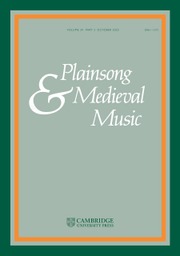Article contents
A typology of historiae in West Francia (8–10 c.)
Published online by Cambridge University Press: 28 April 2004
Abstract
This article presents a typology for a large corpus of Proper Offices from the former Francia occidentalis, composed before the year 1000. A threefold classification for these historiae will be proposed: (1) the Carolingian basilical Office (8–9 c.); (2) Offices organized in modal order (after 900); and (3) Offices composed around the year 1000. The methodology established for this hitherto unpublished, not widely known repertory will permit certain conclusions to be drawn. For example, some Offices have historical importance either because of their age or because of the evolution of the style of melodic composition which they imply, or because they belong to a hagiographic output significant in the history of Carolingian texts. These historiae suppose the literary participation of well-known authors like Hilduin of St Denis, Hincmar of Rheims or Milo and Hucbald of St Amand, thus inviting us to rethink attribution criteria applicable to these historiae. I propose to focus essentially on the written transmission of the repertory in Western sources of plainchant. This transmission is characterized by a series of continuities and disruptions in the process of diffusion and exchanges among basilicas, monasteries and cathedrals of Carolingian and post-Carolingian Francia. The reworking of hagiographic texts suggests a model applicable to the rewriting process found in musical compositions.
- Type
- Research Article
- Information
- Copyright
- © 2004 Cambridge University Press
- 2
- Cited by




